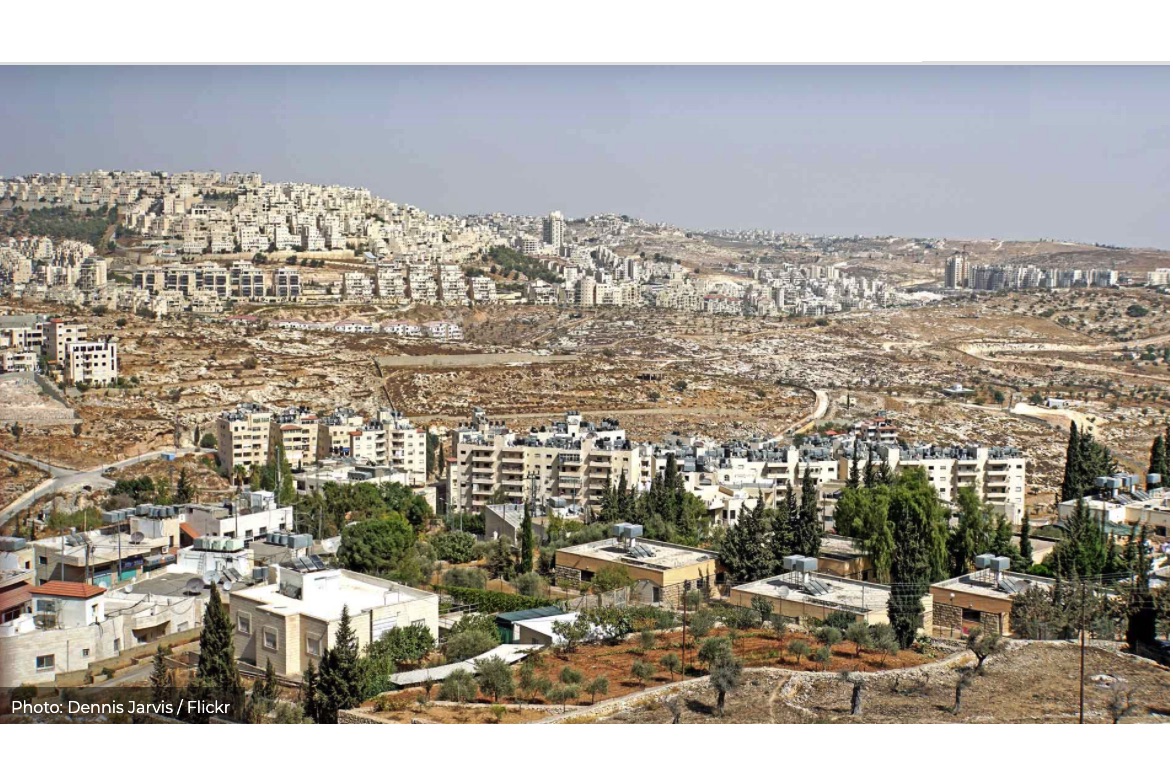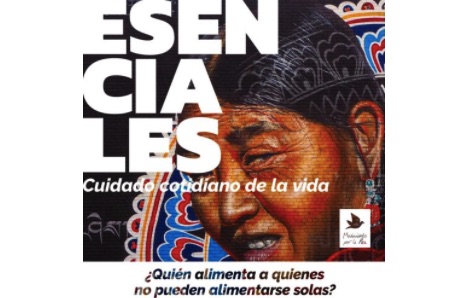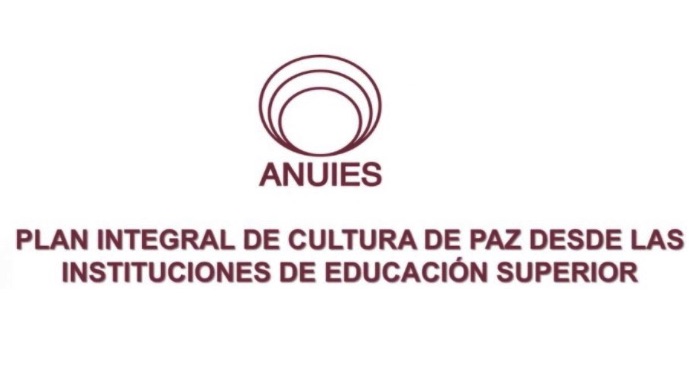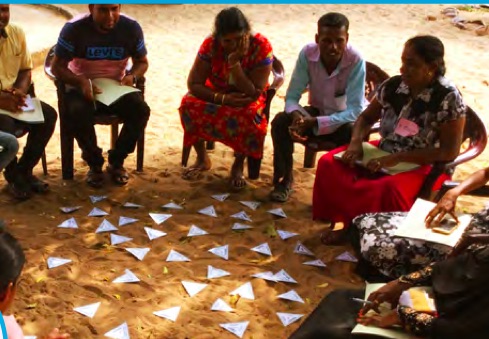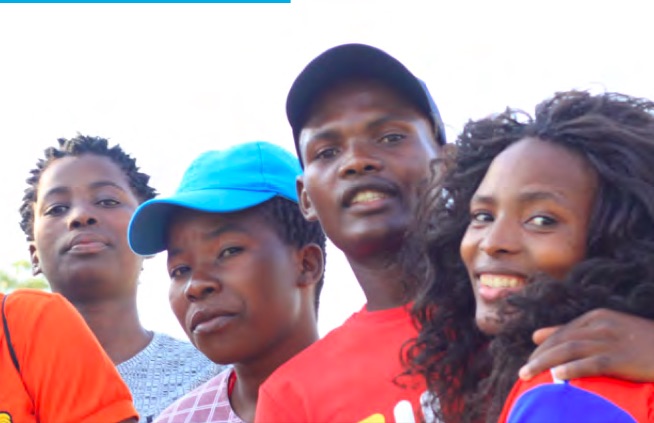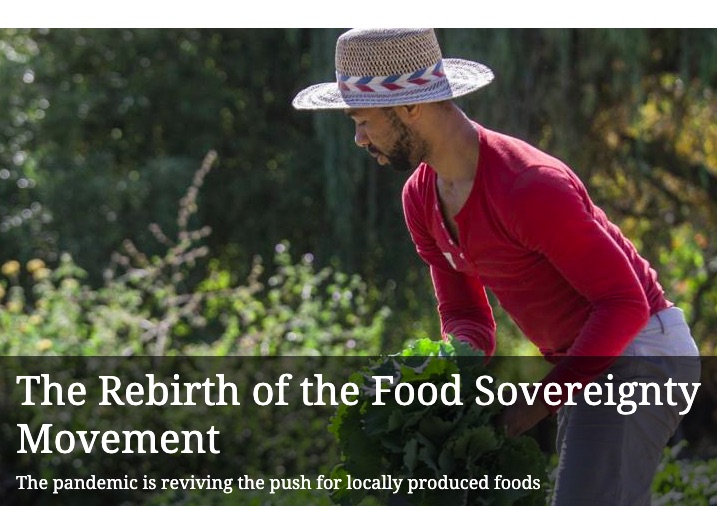. . SUSTAINABLE DEVELOPMENT . .
A communiqué from Navdanya International for the Planetary Coalition
The Covid-19 pandemic is a Planetary wakeup call from the Earth to humanity.
It reminds us that we are one with the Earth, not separate from it, that we are not her masters, owners and conquerors, nor that we are superior to other species, as the anthropocentric dogma would have us believe.
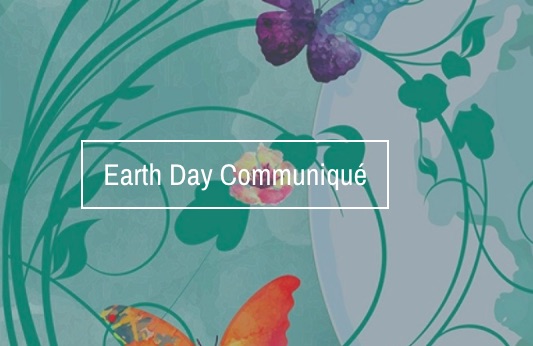
The pandemic is reminding us that we violate the rights of the Earth and all her species at our own peril. And it would be necessary to value and learn from the ancestral knowledge, cosmo-vision and wisdom of the original peoples, guardians of the Earth down the ages, whose deep respect for the Earth is based on the awareness of the interconnectedness of all life. Harming one part means harming the whole.
This pandemic is not a “natural disaster”, just as the crisis of species extinction and climate extremes are not “natural disasters”. Emergent disease epidemics are anthropogenic – caused by human activities.
The Earth is an interconnected web of life.
The health emergency we face as a global community is connected to the health emergency the Earth is facing: its steady degradation, the extinction and disappearance of species and the climate emergency. When we use poisons and agro-toxins, such as insecticides and herbicides to kill insects and plants in the industrial model of agriculture, we produce desertification, we pollute water, soil, air, and destroy biodiversity. Agro-toxins are immunosuppressants, that weaken the body and make it more vulnerable to infections. Agro-toxins are driving species to extinction including pollinating agents, as we have seen in the decimation of bees. When we do open-pit metalliferous mining we use millions of liters of water that is essential for human and natural life. When we practice hydraulic fracturing or “fracking”, we alter the geological conformation and increase the seismic risk. When we burn fossil carbon that the earth has fossilised over 600 million years, we violate planetary boundaries. By industrialising and globalising our food systems we contribute up to 50 percent of the greenhouse gases and climate change is the consequence.
Science informs us that as we invade forest ecosystems, destroy the homes of species and manipulate plants and animals for profits, we create conditions for new disease epidemics. Over the past 50 years, up to 300 new pathogens have emerged. It is well documented that around 70 percent of the human pathogens, including HIV, Ebola, Influenza, MERS and SARS emerged when the forest ecosystems are invaded, and viruses jumped from animals to humans.
When animals are cramped in factory farms for profit maximisation, new diseases like swine flu and bird flu spring up and spread. Agrochemical-intensive industrial agriculture and industrial food systems give rise to non-communicable chronic diseases like birth defects, cancer, endocrine disruption, diabetes, neurological problems, and infertility. With COVID-19 infections, morbidity goes up dramatically with these pre-existing conditions.
While claiming to feed the world, industrial agriculture has pushed a billion humans to hunger and this number is growing with the world-wide lockdown and the destruction of livelihoods. Our health and the health of the planet is one health. Respecting planetary boundaries, ecosystem boundaries and species integrity is vital to protecting the planet and our health. The solutions to Climate Change are also solutions to avoiding new disease epidemics. The debate on the climate change issue cannot avoid considering how the dominant technological and economic model, based on fossil fuels, does not take into account the finitude of the Earth’s resources. A global economy based on the myth of limitless growth and limitless appetite for Earth’s resources is at the root of this health crisis and future crises.
The holistic and integrated response to the health emergency is to make a transition from the fossil fuel intensive, chemical intensive paradigm of agriculture and globalised trade, with its heavy ecological footprint, to local, biodiverse, ecological systems of producing and distributing food, to healing the Earth, and healing ourselves as being part of the Earth.
Our Earth Day Commitment: Return to Earth, in our minds, our lives
During the COVID-19 crisis and in the post-Corona virus recovery we must learn to protect the Earth, her climate systems, the rights and ecological spaces of diverse species, and diverse peoples – indigenous people, youth, women, farmers and workers. For the Earth there are no expendable species and no expendable peoples. We all belong to and are part of the Earth.
To avoid future pandemics, future famines and a possible scenario of expendable people, we must move beyond the globalised, industrialised and competitive economic system, which is driving climate change, pushing species to extinction, and spreading life-threatening diseases. Localisation leaves space for diverse species, diverse cultures and diverse local living economies to thrive.
We must shift from the economics of greed and limitless growth, of competition and violence, which have pushed us to an existential crisis, and move to an “Economy of Care” – for the Earth, for people and for all living species. We must reduce our ecological footprint, to leave a just share of ecological space for other species, all humans, and future generations. We must stop seeing nature’s common goods as “resources”, abandon the utilitarian, colonial, capitalist and anthropocentric vision that has taught us to name nature’s gifts as “natural resources”. Only in this way will we be able to consciously reduce our ecological footprint: by acting responsibly as the ancestors of the future.
The health emergency and lockdown has shown that when there is a political will, we can de-globalise. Let us make this de-globalisation of the economy permanent, and localise production in line with Gandhi’s philosophy of “Swadeshi” – made locally. As the Pandemic shows, it is local food communities who are able to regularly provide and distribute food while globalised food chains, in some parts of the world, collapsed and even speculated with rising food prices.
Contrary to what we are made to believe, it is not globalisation that protects people from famines, which it produces and aggravates, but peoples food sovereignty, where people at the community level have the right to produce, choose and consume adequate, healthy and nutritious food, under fair price agreements for local production and exchange. Future food systems have to be based on seed sovereignty and food sovereignty, on local circular economies giving back to the earth , and ensuring fair prices to producers .
The mechanistic mind that dominates our societies, creates corporate and personal profits through extraction and manipulation. The corporations and billionaires who through their actions have declared war against the Earth and created the world’s multiple crises, are now preparing for the intensification of industrialised agriculture through digitalisation and artificial intelligence. They are envisioning a future of farming without farmers, and a future of fake food produced in labs. Such developments will deepen the ecological crisis, destroying biodiversity and increasing our separation from the Earth.
Food is the web of life and making peace with the Earth begins with food. We return to the Earth when we take care of the soil and biodiversity. We remember we are human because we are of “humus” – of the soil. Only our minds, hearts and hands working together with the Earth, as integral parts of her creativity, can heal the Earth, providing us and all other species with healthy food.
(Article continued on right side of page)
(Click here for the Communiqué in French or click here for the Manifiesto in Spanish).
Question for this article:
What is the relation between movements for food sovereignty and the global movement for a culture of peace?
How can we work together to overcome this medical and economic crisis?
(article continued from left side of page)
As our experience together with other Earth conscious organisations and networks for Seed Freedom and Food Freedom have taught us, local, biodiverse organic food systems regenerate soil, water and biodiversity and provide healthy food for all. The biodiversity richness in our forests, our farms, our food and our gut microbiome connect the planet and her diverse species, including humans. Thus, health becomes the common thread, as does disease which the Coronavirus is so clearly showing us today.
The war against the Earth is a war against the future of humanity.
All life-threatening emergencies of our times are rooted in a mechanistic, militaristic and patriarchal world view of humans as separate from nature – as masters of the Earth who can own, manipulate and control other species as objects for profits. It is also rooted in an economic model that views ecological and ethical limits as obstructions that must be removed in the interests of unbridled corporate profit and power.
Scientific predictions indicate that if we do not stop this anthropogenic war against the Earth and her species, we will soon destroy the very conditions that allowed humans to evolve and survive. Human greed, arrogance and irresponsibility speeds us to the next Pandemic – and finally to extinction.
The Earth reflects who we are. She is showing us her inter-connectedness and calling us to start recognising her diverse living intelligences – in the soil food web, in plants and animals, and in our food.
The Earth has sent a tiny invisible virus to help us make a quantum leap to create a new planetary, ecological civilisation based on harmony with nature — today it is a survival imperative.
Our Resolve
In signing this manifesto, we commit ourselves as a planetary coalition, to urge and exhort the authorities and representatives of the governments in each one of our countries, cities, towns and communities, to shift from the paradigm of ecocide that today governs our models of productivity, to a paradigm where ecological responsibility and economic justice are central to creating a healthy and vibrant future for humanity.
Real climate change action means leaving behind our petroleum-based civilisation of extraction and greed and bringing in a new era of interconnection and care of the Earth. We call for concerted support of communities, territories and nations that put ecology at the centre of a paradigm of a new and just economy of care.
On Earth Day let us apologise for the harm we have done to the Earth through the illusion of separation, creating violent paradigms and violent tools which have waged war against the Earth. Let us commit to making peace with the Earth and all her species by co-creating with her on the basis of her laws of life.
The Earth has given us a clear message through the Coronavirus pandemic. It is our moral imperative to seize this moment in time to make a transition to an ecological civilisation so we sow the seeds of a common future for humanity and all beings.
Together we rise as Children of The Earth!
A Call to Action and Transformation – One Planet, One Health
It is time to abandon our resource intensive and profit intensive economic systems that have created havoc in the world, disrupting the planet’s ecosystems and undermining society’s systems of health, justice and democracy.
The Corona virus pandemic and consequent global economic collapse, and collapse of lives and livelihoods of millions calls us to urgently take action. Let us prepare for a post Corona Recovery where the health and wellbeing of all peoples and the planet are at the centre of all government and institutional policy, community building and civic action
Actions for sowing the seeds of a new Earth Democracy include:
> Promote and protect biodiversity richness in our forests, our farms and our food to stop the destruction of the earth and the sixth mass extinction
> Promote local, organic, healthy food through local biodiverse food systems and cultures and economies of care (farmers markets, CSAs biodistricts).
> Stop subsidising industrial agriculture and unhealthy systems that create a burden of disease. Public subsidies should be redirected to systems based on agroecology and biodiversity conservation, which provide health benefits and protect common goods.
> Halt subsidies and further investments in fossil fuels sector, including fossil fuel based agricultural inputs, as real climate action
> Stop favouring industrial junk food and unhealthy food systems based on toxic and nutritionally empty commodities.
> Put an end to monocultures, genetic manipulation of plants and factory farming of animals which are spreading pathogens and antibiotic resistance
> Stop deforestation, which is expanding exponentially through industrial monocultures for corporate interests. Forests are the lungs of the Earth.
> Practice sustainable agriculture based on integration of diversity of crops, trees and animals.
> Save, grow and reproduce traditional seed varieties to safeguard biodiversity. They need to be saved not as museum pieces in germplasm banks, but in living working seed banks as a basis of a health care system.
> Create poison free zones, communities, farms and food systems.
> Introduce policies to assess the costs of damage to health and the environment caused by chemicals and enact the polluter pays principle.
> Health must have priority over corporate interests with respect to chemical and pesticide use in food and agriculture. The precautionary principle must be enacted.
> Transition from globalisation to localisation and make permanent deglobalisation. Stop the corporate takeover of our food and health
> Introduce local circular economies which increase the wellbeing and health of people
> Support, regenerate and strengthen communities
> Create Gardens of Hope, Gardens of Health everywhere – in community gardens, institutions, schools, prisons, hospitals in the cities and countryside
> Stop using Growth’ and GDP as measures of the health of the economy. GDP is based on the extraction of resources from nature and wealth from society
> Adopt citizens wellbeing as a measure of the health of the economy..
We hope you will join us in this transformation for hope and care for the Earth. To endorse please go to this link. Please also invite your networks and friends to endorse.
* * * * *
The Planetary Coalition includes, among others, Navdanya International, Naturaleza de Derecho, Health of Mother Earth Foundation, Ifoam, Regeneration International, Third World Network, International Forum on Globalization, Biovision, Sarvodaya Movement, SAM-Sahabat Alam Malaysia and CAP-Consumers Association of Penang, Council of Canadians, Initiative for Health and Equity, Diverse Women for Diversity, Isde-International Society of Doctors for the Environment, Terra de Direitos, Conamuri – Organización de Mujeres Campesinas e Indígenas, Acción Ecológica. Also joining the call are renowned leaders, scientists and environmentalists including, Vandana Shiva, Nnimmo Bassey, Fernando Cabaleiro, Jerry Mander, Adolfo Perez Esquivel, Maude Barlow, André Leu, Hans R Herren, Satish Kumar.


